How long does it take you to write marketing emails?
If you’re anything like me, you put lots of thought, effort, and time into each and every word in the message. That’s what it takes to write actionable email newsletters.
Your message is full of great content. You might even have some discounts, coupons, or other promotional offers there as well.
Maybe you’re promoting a new product, service, or trying to drive traffic to a landing page. Regardless of the goal of your marketing emails, all of your campaigns have one thing in common:
subscribers need to open them to see your message.
Sounds simple, right? But all too often I see marketers come up with a subject line in two seconds and send out the message.
The subject line is the first thing the recipient sees when they get your email. Just how important is it?
Well, 35% of people open emails based solely on the subject line. Furthermore, 69% of people mark messages as spam based on the subject line.
Basically, your subject line will make or break the success of your marketing campaigns.
To increase your open rates, you’ve got to come up with subject lines that stimulate interactivity, which I identified as one of my top marketing trends of 2018.
But you can’t use the same subject line over and over. That gets boring, and your subscribers will catch on.
That’s why I created this list of the top 7 subject lines that increase open rates. Now you have a reference guide for every message you send.
Let’s dive in.
1. Personalized subject lines
Adding a personal touch to your subject lines can help increase open rates.
In fact, the Institute of Direct and Digital Marketing (IDM) identified these as the top benefits of personalized emails:

As you can see from their data, increase in open rates was the first benefit of personalized subject lines.
Personalized subjects can have a larger impact on your campaign as well. You’ll also get more clicks, fewer unsubscribes, higher customer satisfaction, and more sales.
What kind of information can you use to personalize a subject line? You can use your customer’s:
- name
- postal location
- birthday
- current location
- info related to their transaction history
- content related to browsing history
- product recommendations
- social media accounts
If you’re on the fence about what’s appropriate to use, start off by addressing the recipients by their first name in the subject. See how much of an impact that has on your open rates.
How much of a difference will it make?
Well, research shows that personalized email messages improve clicks by 14% and increase conversions by 10%.
Studies also show that personalized promotional emails result in 29% higher open rates.
The reason why this strategy works is because it helps you establish a more intimate connection with your subscribers. They’ll see that the content was created specifically for them as opposed to a mass audience.
I’m much more likely to open a message that says “Hey Neil!” than the one that begins with “Dear Valued Customer.” The first one makes it seem like I personally know the sender.
Give this method a try next time you’re sending out an email.
2. Subjects that create a sense of urgency
Are you familiar with the concept of FOMO? It stands for the “fear of missing out” on something.
Social media websites today make FOMO more prevalent. Take a look at these numbers:
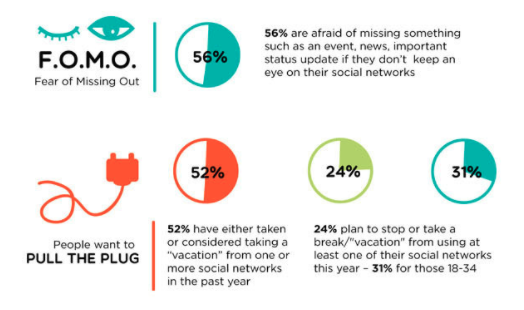
FOMO has become such a problem for people that it’s impacting the way they live their lives. You can stimulate this powerful emotion in your email subject lines.
How can you create a sense of urgency?
Offer a sale with an expiration date.
If someone is on your subscriber list, they’ve probably bought something from your company in the past. Even if they haven’t, they’re interested enough to probably buy something soon.
While your coupon might be available in the body of the message, you need to make it obvious in the subject line.
Let’s compare two hypothetical subject lines. Which one do you think is more effective?
“New weekly coupon inside!”
or
“25% off sale ends tonight!”
I promise you that the second example will get more opens than the first one. That’s because the deadline of “ends tonight” gives people a reason to act fast.
If they don’t open the message now, they’ll fear they will be missing out on a great deal—FOMO.
Another way to generate urgency is by alluding to a limited quantity of something remaining. Here’s a great example from GetResponse:
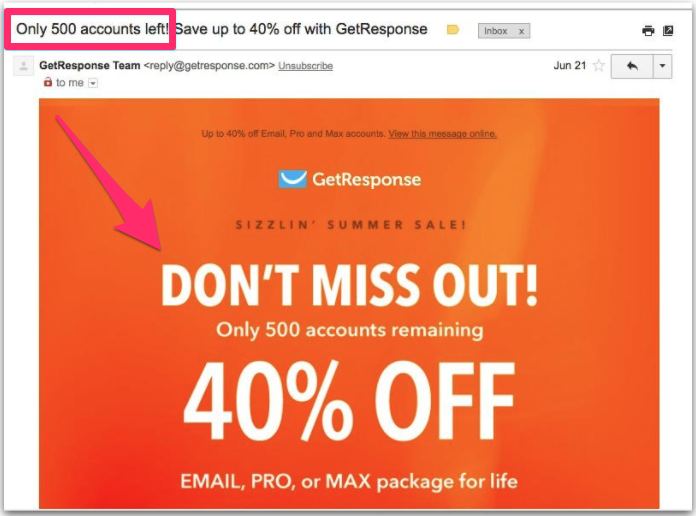
GetResponse is an email marketing software. So it’s no surprise they have a great email subject line to promote their services.
The idea is to get people to act fast.
If your subject line says the deal is valid until the end of the month, the recipient has no reason to open it now. They may never end up opening it.
But that can change if you generate urgency.
3. Breaking news subject lines
Your content needs to be highly relevant.
If your company isn’t in the news reporting or media industries, you’ll have to get creative here. Here’s what I mean.
You don’t need to send emails reporting a local robbery or car accident. But you can link recent news to your business.
For example, let’s say you have an ecommerce company that sells clothing. You’ve got your email subscribers segmented by location based on their zip codes.
It’s February, and a winter snowstorm is approaching the states in New England.
You could send an email with a breaking news subject line about the storm and say that you’re selling winter coats, hats, and gloves at a discounted rate.
MailChimp conducted a study in which they analyzed 24 billion emails. These subject lines had roughly 22,000 unique words.
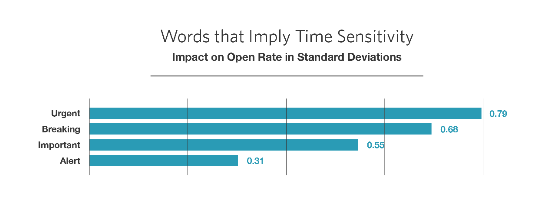
Their data showed that people opened messages with keywords that were related to breaking news.
If you can’t think of create ways to link recent news to your email campaigns, create some news of your own. Share recent news about your company.
Talk about things like:
- a new product release
- an approaching event
- new member of your staff
And make them sound like news headlines in your subject lines.
4. Subject lines that tell a story
You can get more sales by mastering the art of storytelling. But you can also increase your email open rates with the same tactic.
Everyone loves to hear a good story.
That’s why we read books, watch movies, and sit for hours watching our favorite television shows on Netflix. The stories keep us captivated.
You should tell stories in your emails to capture the attention of your subscribers. Then you can include CTAs within the story or have the general theme of your story prompt an action.
But the key here is to use the subject line as a teaser for the story.
If you’re trying to drive traffic to a new post you wrote, consider using its title as your subject line—if it tells a story.
Here’s an example of an old post I wrote about spending money on clothes and being able to generate a profit:
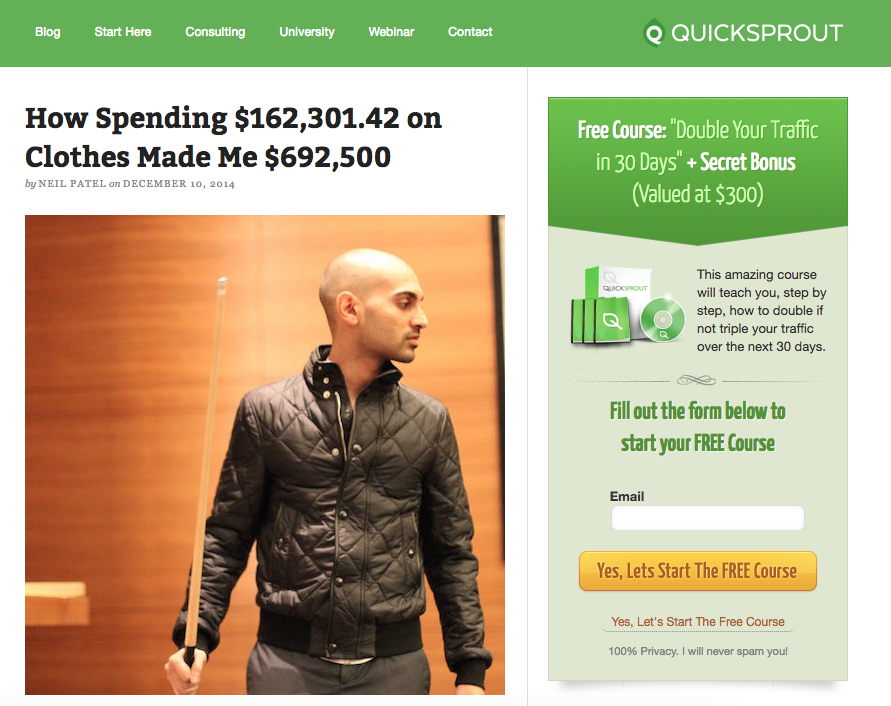
That’s a headline that grabs a reader’s attention.
If I wanted to promote this post via email, I could use its title as the subject line. Both of those numbers, spent and earned, are too high for people to ignore.
They might ask themselves, “How could you make that much money just by spending money on clothes?”
Then they would click to read the story or, in this case, open your email.
5. Stimulate curiosity with a subject line
People are curious by nature.
Refer back to our last example about storytelling. The reason why someone would want to click on that message is because they are curious.
Your subject line should try to pique the curiosity of your subscribers.
Don’t give it all away in the subject line. Instead, hint at something that they’ll find out if they open your message.
Rather than saying, “here’s 30% off your next purchase,” you can create a mystery sale instead. If you just tell the subscriber their discount, they don’t have a reason to open the message unless they are ready to use it.
Here’s an example from Forever 21 of an email that employs this technique:
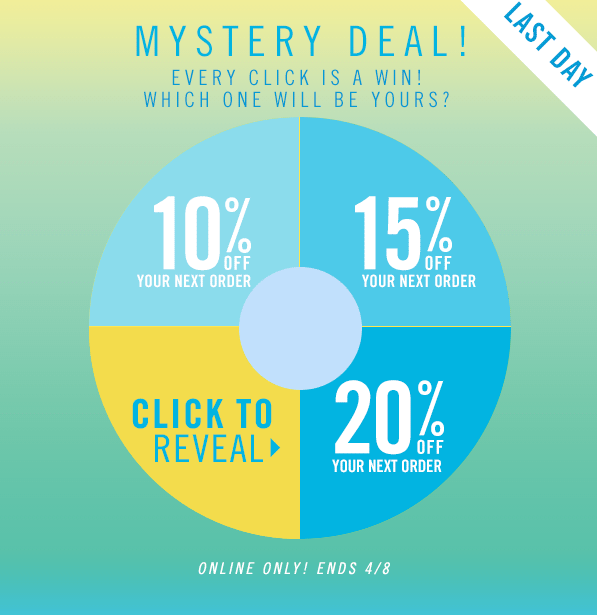
Apply the same concept to your subject line.
It doesn’t have to be applied to sales only. You can hint at a mystery event or maybe even a special guest on your next podcast.
Just make sure you’re not giving away all the information in the subject line.
Here’s another example. Let’s say you’re in the food industry. You want to send out an email about the most popular foods in America.
Potatoes are the most commonly consumed vegetable in the United States.
But you wouldn’t write that in your subject line.
Instead, you would write something like, “What’s America’s favorite vegetable? We’ve got the answer.”
This subject makes the recipient wonder, whereas just stating the answer gives them no reason to actually open the message.
6. Short subject lines
No matter what type of content your subject line contains, it needs to be short. Avoid using really long sentences and unnecessary characters.
To optimize the length of your subject lines, I recommend writing out several drafts before deciding on one. Then you can pick and choose pieces of each draft so you can get your message across as short as possible.
So how long is too long? Studies show that email subjects lines that have between 1 and 20 characters have the highest open rates.
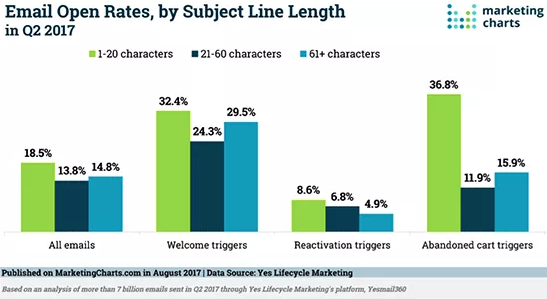
As you can see, this statement holds true across the board, regardless of what the email entails.
This could be due to the fact if the subject line is too long, the recipient may not be able to see all of the words in their inbox.
55% of emails get opened on a mobile device.
You’ve got to take this into consideration when you’re crafting a subject line. While it may look fine on your computer, this changes when it’s being looked at on a smaller screen.
Here’s an example to show you what I’m talking about.
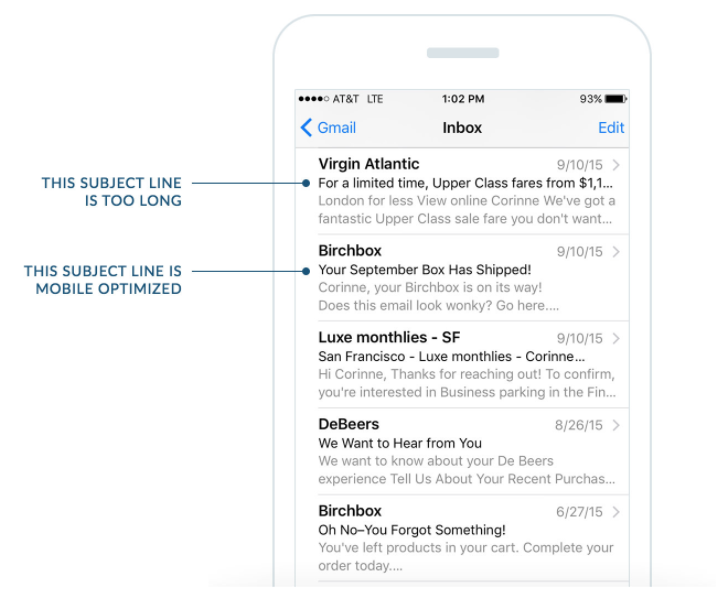
While most businesses realize that their emails need to optimized for mobile devices, they forget about the subject line.
Overall, if your subject line is short, you’ll get higher open rates.
7. Subject lines with free stuff
It’s OK to give things away for free. Some companies avoid this because they think it’s not profitable, which I completely understand.
Look, I’m not saying you need to give away your most expensive products for nothing. But it doesn’t hurt to give away a free gift with a purchase every now and then.
This is especially true if you’re using an email campaign to promote the free offer.
Why?
Take a look at these numbers.
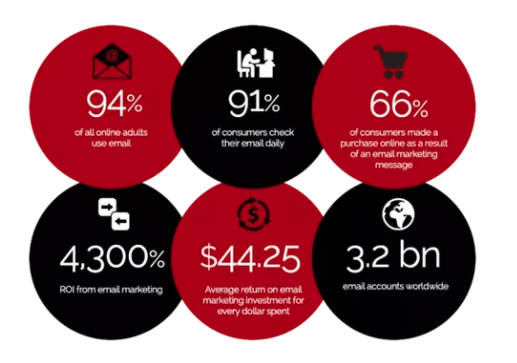
Email marketing campaigns generate a 4,300% return on your investment. That’s because it’s not expensive to send emails.
You’re likely only paying a marginal monthly or annual fee for your software.
Plus you get so many benefits like an increase in sales, more website traffic, and new leads. So it’s OK to use this platform to promote a free offer.
Include the word “FREE” in your subject line to get more subscribers to open your messages.
Conclusion
Your email campaigns might be great, but if you can’t get people to open up the messages then it’s pointless.
I know how much time you spend writing your emails, so you need to put just as much effort into the subject lines.
Used personalized subjects that generate curiosity. You can also use your subject line to tell a story or talk about some kind of breaking news event.
Stimulate curiosity. Make the reader want to find out more information by clicking the message.
Give away free stuff and tell people about it in your subject line.
No matter which tactic you use, just try to keep your subject lines short. Make sure that they can be read on mobile devices.
If you follow these tips, you’ll get significantly higher open rates.
What types of subject lines are you using to get subscribers to open your messages?
from Quick Sprout http://ift.tt/2nUzhqL
via IFTTT
No comments:
Post a Comment